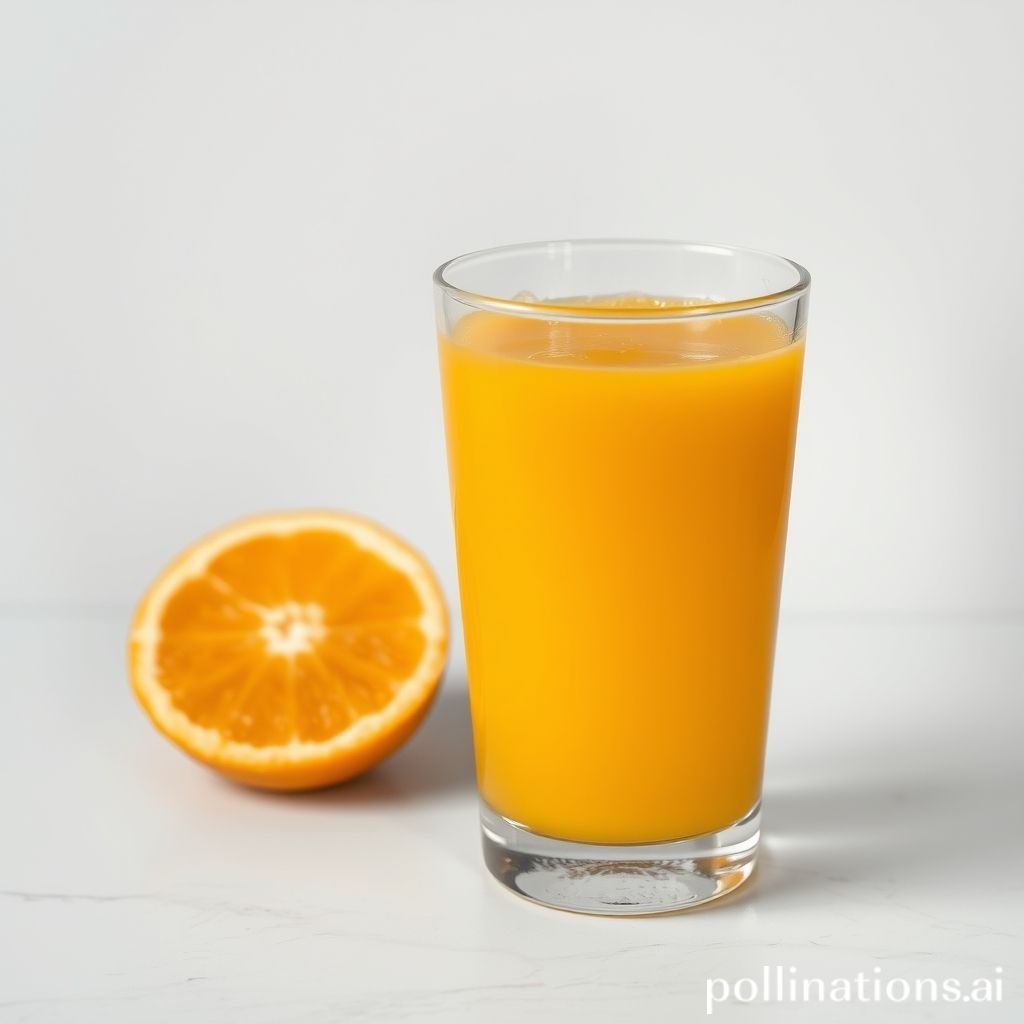Preserving Freshness: How Long Can Orange Juice be Left Out?
[su_note note_color=”#fb8e00″ text_color=”#000000″ radius=”12″]
Orange juice is a popular beverage enjoyed by many, especially during breakfast. In contrast, have you ever wondered how long you can leave orange juice out before it spoils or becomes unsafe to consume? This question has sparked curiosity among juice enthusiasts, prompting them to seek answers.
In this article, we will delve into the topic of orange juice shelf life, Investigating the factors that affect its freshness and safety. So, if you’re interested in learning how long you can leave orange juice out without compromising its quality, keep reading to satisfy your thirst for knowledge.
[su_box title=”
[/su_box]

Factors Affecting the Shelf Life of Orange Juice
1. Temperature
The temperature at which orange juice is stored affects its shelf life. Higher temperatures can cause orange juice to spoil more quickly. This is because warm temperatures create an ideal environment for the growth of bacteria and other microorganisms that can spoil the juice. To extend the shelf life, it is important to store orange juice in a cool place, preferably refrigerated.
2. Exposure to Air
Exposure to air can speed up the spoilage process of orange juice. Oxygen in the air reacts with the juice, causing oxidation of its components. This oxidation can change the taste, color, and nutritional value of the juice, making it unfit for consumption. To prevent this, it is crucial to properly seal the container to minimize contact between the juice and air. It is recommended to use airtight containers or bottles with airtight caps when storing orange juice.
3. Light Exposure
Light exposure can also negatively impact the quality and shelf life of orange juice. Ultraviolet (UV) rays from sunlight can degrade certain components of the juice, such as vitamin C and flavor compounds. This degradation can result in a loss of nutritional value and flavor. To minimize light exposure, it is advisable to store orange juice in opaque containers that can block out harmful UV rays. This helps preserve the freshness and quality of the juice for a longer period.
[su_highlight background=”#f6b40f”]Expert Tips:
1. Store orange juice in a cool place, preferably refrigerated, to extend its shelf life.
2. Properly seal the container to minimize air exposure and prevent oxidation.
3. Store orange juice in opaque containers to minimize light exposure and preserve its freshness.[/su_highlight]
Unopened Orange Juice Shelf Life
1. Refrigerated Orange Juice
Refrigerated orange juice has a shorter shelf life compared to shelf-stable varieties. It should be consumed within a specific timeframe to ensure freshness and safety.
- Shelf Life Estimate: Unopened refrigerated orange juice typically lasts for about 7 to 10 days.
- Expiration Date: Before consuming refrigerated orange juice, it is crucial to check the expiration date on the packaging. This date indicates the last day the product is guaranteed to be at its best quality.
2. Shelf-Stable Orange Juice
Shelf-stable orange juice, also known as long-life orange juice or UHT orange juice, has a longer shelf life compared to refrigerated varieties. It is specially processed to last for an extended period without the need for refrigeration.
- Shelf Life Estimate: Unopened shelf-stable orange juice typically lasts for several months or even up to a year, depending on the brand and storage conditions.
- Flavor Degradation: In the course of shelf-stable orange juice can remain safe to consume for a longer time, there is a potential for flavor degradation over time. The taste may become less vibrant or slightly different, but it should still be safe to drink.
To ensure the best quality and taste, it is always recommended to consume orange juice within the recommended shelf life. Proper storage conditions, such as refrigeration for the refrigerated variety or cool and dry storage for shelf-stable options, can help maintain the freshness and flavor for a longer period.
| Orange Juice Type | Unopened Shelf Life | Storage Requirements |
|---|---|---|
| Refrigerated | 7 to 10 days | Keep refrigerated at or below 40°F (4°C) |
| Shelf-Stable (UHT) | Several months to a year | Store in a cool and dry place, away from direct sunlight |
Opened Orange Juice Shelf Life
1. Refrigerated Orange Juice
- Estimating the Shelf Life: Opened refrigerated orange juice usually lasts for 5-7 days.
- Ensuring Safety: It is important to consume refrigerated orange juice within this timeframe to minimize the risk of spoilage or bacterial growth.
2. Shelf-Stable Orange Juice
- Shelf Life Duration: Opened shelf-stable orange juice has a longer shelf life compared to refrigerated juice.
- Refrigeration after Opening: Despite being shelf-stable, it is recommended to refrigerate the juice after opening to maintain its freshness and extend its shelf life.
Improperly stored and opened orange juice can become a breeding ground for bacteria, which can pose health risks. By observing these guidelines, you can ensure the safety and quality of your opened orange juice.

Signs of Spoiled Orange Juice
1. Visual Indicators
When determining if orange juice has spoiled, visual cues can be helpful. Here are some visual indicators to look out for:
- Mold: If you see any mold growth on the surface of the orange juice, it has spoiled and should be discarded immediately.
- Discoloration: Spoiled orange juice may appear dark or cloudy. If the juice looks significantly different from its original color, it’s best to be cautious and avoid consuming it.
2. Smell
Trust your sense of smell to determine the freshness of orange juice. Spoiled orange juice can have an unpleasant odor. Here’s what to look out for:
- Foul Odor: If the orange juice smells sour, rancid, or generally unpleasant, it has gone bad. Dispose of it to avoid any potential health risks.
3. Taste
The taste of orange juice can also indicate its freshness. If you notice any off flavors, it’s better to be safe. Here’s what you should know:
- Unpleasant Taste: Spoiled orange juice may taste sour, fermented, or generally unpleasant. If the juice tastes different from its usual refreshing flavor, it’s recommended to refrain from consuming it.
To ensure your safety and enjoyment, it’s crucial to pay attention to these signs of spoiled orange juice. Remember, when in doubt, it’s always better to discard the juice rather than risk consuming something that may be harmful to your health.
| Information |
|---|
| Always check the expiration date on the orange juice packaging. |
| Refrigeration can help prolong the freshness of orange juice. |
| When in doubt, consult a healthcare professional. |
[su_note note_color=”#ea2e0c” text_color=”#ffffff” radius=”8″]Extra Tips: Check the expiration date, refrigerate, and consult a healthcare professional when in doubt.[/su_note]
Proper Storage and Handling Tips
1. Refrigeration
It is crucial to refrigerate orange juice to maintain its freshness and prevent spoilage. After opening a container of orange juice, store it in the refrigerator. Refrigeration slows down the growth of bacteria and other microorganisms, ensuring that the juice remains safe to consume for a longer period. The cold temperature also helps retain the flavor and quality of the juice.
When storing orange juice in the refrigerator, follow these guidelines. Firstly, ensure that the refrigerator temperature is set between 32°F and 40°F (0°C and 4°C) for optimal freshness. Secondly, store the orange juice in a clean, airtight container to prevent air exposure and the absorption of odors from other food items in the fridge. Lastly, it is advisable to consume the refrigerated orange juice within 7-10 days for the best quality.
2. Sealing the Container
Properly sealing the container of orange juice is essential to prevent air exposure, oxidation, and spoilage. Use airtight containers or resealable caps to ensure the freshness, color, and nutritional value of the juice.
When using a resealable cap, make sure it is tightly closed after each use to minimize air contact. If using a container without a resealable cap, transfer the orange juice to an airtight container before refrigeration. By sealing the container properly, you can extend the shelf life of the orange juice and enjoy it for a longer period.
3. Avoiding Cross-Contamination
Preventing cross-contamination is crucial when handling orange juice to ensure its safety and quality. Cross-contamination can occur when the juice comes into contact with dirty utensils or containers, leading to the growth of harmful bacteria.
To avoid cross-contamination, always use clean utensils and containers when pouring or storing orange juice. Wash your hands thoroughly before handling the juice to minimize the transfer of bacteria. Additionally, avoid placing the container of orange juice on surfaces that may have come into contact with raw meat, seafood, or other potentially contaminated foods.
By adhering to these storage and handling tips, you can maintain the freshness, taste, and safety of orange juice, ensuring that you can enjoy it at its best for a longer period.
Conclusion
In this article, we explored the question of how long orange juice can be left out before it spoils. It is crucial to understand that leaving orange juice unrefrigerated for an extended period can lead to spoilage and potential health risks.
We discussed the importance of proper storage and handling to maintain the freshness of orange juice. Remember to refrigerate orange juice promptly after opening and consume it within a few hours to ensure its safety and quality. By adhering to these guidelines, you can enjoy fresh and delicious orange juice every time.
Frequently Asked Questions (FAQ) About Orange Juice
FAQ 1: How long can I leave unopened orange juice out?
Unopened orange juice should not be left out at room temperature for more than two hours. It is important to store unopened juice in the refrigerator to maintain its freshness and prevent bacterial growth.
FAQ 2: Can I still drink orange juice past its expiration date if it has been refrigerated?
No, it is not recommended to consume orange juice past its expiration date, even if it has been refrigerated. The expiration date indicates the date until which the juice is expected to maintain its quality and safety. After the expiration date, the juice may spoil and pose a health risk.
FAQ 3: Is it safe to consume orange juice that has been left out overnight?
No, it is not safe to consume orange juice that has been left out overnight. Bacteria can multiply rapidly in perishable food items like orange juice when left at room temperature for an extended period. It is advisable to discard any juice that has been left out for more than two hours.
FAQ 4: Can I freeze orange juice to extend its shelf life?
Yes, freezing orange juice can extend its shelf life. Before freezing, ensure the juice is stored in airtight containers, leaving some space for expansion. When ready to use, thaw the juice in the refrigerator and consume it within a few days. It is important to note that freezing may slightly alter the texture and taste of the juice.
FAQ 5: What are the alternatives to refrigerating orange juice after opening?
If you don’t have access to refrigeration, an alternative to keeping orange juice fresh after opening is to use a thermal flask or cooler bag with ice packs. These can help maintain a cooler temperature and slow down the growth of bacteria. That being said, it is still advisable to consume the juice within a few hours to ensure its safety and quality.
Read Similar Post:
1. Why is Orange Juice Yellow? The Science Behind Its Unexpected Color
2. Is Orange Juice a Natural Remedy for Dehydration? Find Out Now!
